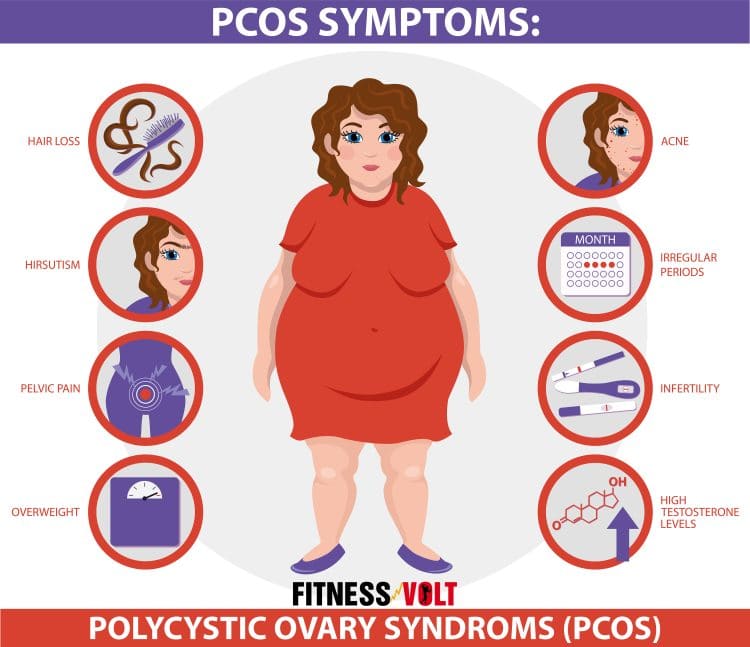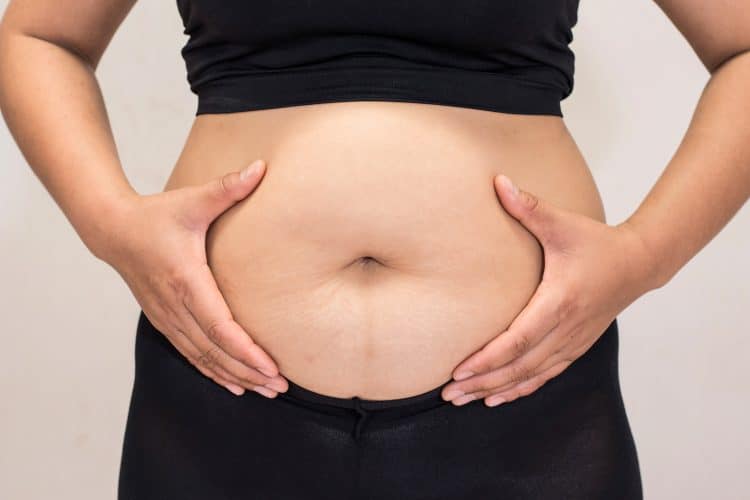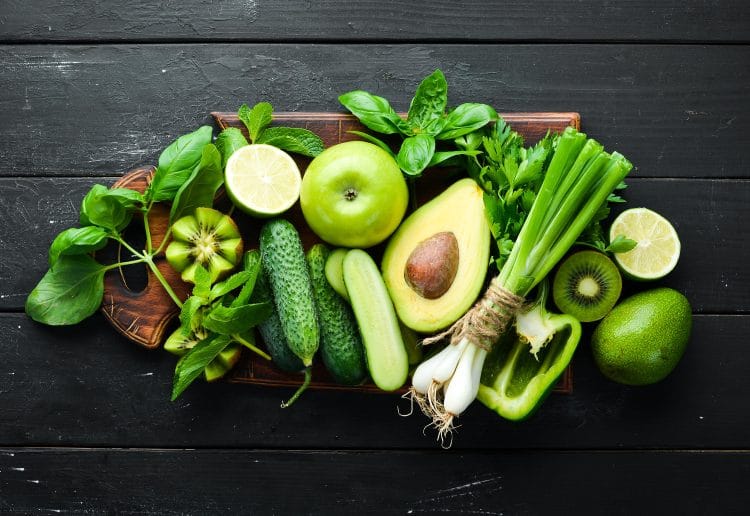Polycystic ovary syndrome (PCOS) is a condition that affects many women of childbearing age. It’s a hormonal condition that may cause irregular periods, acne, and unwanted hair. It might also cause many women to gain excess fat in the abdominal region.
This article covers PCOS in detail, including the changes it may cause to your belly and what you can do about it.
What is PCOS?
PCOS is a hormonal disorder causing enlarged ovaries with small cysts on the outer edges.
A woman has female hormones estrogen and progesterone and the male hormone testosterone. Usually, there is a balance between these hormones.
In PCOS, the male hormones increase, causing irregular cycles, acne, and unwanted hair. (1)
Every month, a woman releases a mature egg, the process known as ovulation. The hormonal imbalance in PCOS prevents the egg from maturing, resulting in a cyst. Women with PCOS may have multiple cysts in the ovary. (1)
It may also cause skin tags, thinning of hair, scalp hair loss, weight gain, and sleep problems. (1)

Also Read: 10 Weird Ways to Speed Up Fat Loss
PCOS and Weight Gain in the Abdominal Area
Experts believe that higher-than-normal male hormones in women are responsible for fat storage in the abdominal area. Furthermore, it may lead to heart diseases, insulin resistance, and type 2 diabetes.
But before we understand what a PCOS belly looks like, it’s crucial to understand the two types of fats in your body: (2)
Subcutaneous fat
It is present below your skin and is soft to the touch. So, if you have subcutaneous fat, your belly will be soft, and you’ll be able to pinch it. Although this type of fat is less harmful, it is hard to shed.
Visceral fat
Visceral fat is present around your organs and is considered dangerous for your health. This fat is stored deep inside the belly and cannot be touched directly. Excess visceral fat is a risk for people with PCOS, diabetes, and other metabolic disorders. However, this type of fat is easy to lose.
What Does a PCOS Belly Look Like?
PCOS involves visceral fat accumulation, and the abdomen is typically hard to the touch. You may have a PCOS belly if you have a high waist-to-hip ratio (apple body shape). However, this may be different for all women and depends on genetics. (3)
Notably, you can have a PCOS belly even if you have a normal weight.
Women suffering from PCOS might also notice increased hair on their bellies.
PCOS may also cause you to feel bloated often. It’s normal to feel bloated occasionally. However, if you are bloated most of the time, you may need to check for other signs of PCOS. In some cases, this bloating can be painful.

Related: Figure Competitor Shares The Extreme Bloating She Experiences After Eating Certain Foods
Factors Responsible for PCOS Belly
PCOS is usually accompanied by excess fat storage in your lower abdomen. However, the body fat percentage might vary from person to person.
Some factors that influence the development of a PCOS belly include:
Hormonal Fluctuations
The severity or intensity of hormonal imbalance and fluctuations influence fat accumulation. The higher the male hormone level in a woman suffering from PCOS, the greater the fat around her belly. (3)
Insulin Resistance
Insulin is a hormone that helps your body cells use glucose for energy. Abnormal functioning of the hormone prevents the use of glucose by the cells, increasing its level in the blood.
In insulin resistance, your body cells are not responsive to insulin, increasing the risk of high blood glucose levels. It triggers your body to produce more insulin to balance glucose levels in the blood.
Higher insulin levels trigger hormonal imbalance and fat accumulation around the organs. (3)
How do I know if I have PCOS belly fat?
The best way to figure out fat distribution in your body is to undergo MRI or CT scans, which are the most accurate techniques.
Alternatively, you can get a simple waist-to-hip ratio. You may have a PCOS belly if the ratio is more than 0.85. (4)
5 Tips For Managing A PCOS Belly
If you have excess fat around your abdomen because of PCOS, the following tips may help:
1. Eat Healthily
A healthy diet can keep all factors responsible for belly fat in PCOS in check, including hormonal imbalance and insulin resistance.
It is no secret that your dietary choice can influence how healthy you are. Proper nutrients will help you lose weight and improve overall health.
Great food options for PCOS include:
- Whole foods such as fruits, vegetables, eggs, and legumes
- Protein-rich foods such as eggs, fish, beans, and soy
- Healthy fats such as nuts, avocado, and fatty fish
- Avoiding processed and packaged foods
- Avoiding dairy products

2. Stay Active
In addition to diet, exercise plays a major role in getting rid of belly fat. As a simple rule, weight is not only about the calories you consume but also the calories you burn.
Some great exercises include:
- Moderate-intensity activities such as running and cycling
- High-intensity activities such as HIIT (high-intensity interval training)
- Sports such as hockey and tennis
- Strength-training exercises such as Pilates and weightlifting
- Yoga
- Walking
3. Get Enough Sleep
Sleep is associated with hormonal balance and significantly affects your overall health. Make sure you get seven to eight hours of uninterrupted sleep.
If you find it difficult to sleep, the following may help:
- Sleep at the same time every day
- Have a sleep routine, such as having an herbal tea or taking a hot shower before bed
- Sleep in a dark room
- Avoid looking at any screen at least 30 minutes before you go to bed

4. Manage Stress
Long-standing stress is a risk factor for various conditions, including PCOS. Moreover, PCOS may trigger stress, making it a vicious cycle.
You can break this cycle by managing your stress through:
- Yoga
- Meditation
- Journaling
- Having a hot bath
- Doing your favorite activity
- Walking
- Dancing
5. Maintain a Healthy Lifestyle
Some common factors that may help with PCOS are quitting smoking and limiting your alcohol intake. Both factors trigger fat accumulation and other conditions, including heart problems.
FAQs
Can you have a flat stomach with PCOS?
Yes. You can have a flat stomach if you follow the dietary and lifestyle changes. However, it may take extra effort to lose weight with PCOS because of associated metabolic and hormonal challenges.
What are the symptoms of PCOS?
Some common symptoms of PCOS include irregular periods, acne, thinning of scalp hair, darkening of the skin, headaches, and an increased waist to hip ratio.
What happens if PCOS goes untreated?
If left untreated, PCOS may have short and long-term health consequences. It may lead to infertility, type 2 diabetes, heart diseases, sleep problems, liver disorders, obesity, and depression. Fortunately, PCOS is treatable, and managing it lowers the associated risks.
Next Read: What is Skinny Fat and How to Fix It
Final Thoughts
PCOS can disrupt a woman’s menstrual cycles, cause infertility, and lead to hair growth on the face and body. Weight loss can be the first step in combating PCOS.
Getting rid of excess belly fat may be challenging with PCOS. But with dietary and lifestyle changes, you can get a flat stomach and improve your health.
References
- Ndefo, U. A., Eaton, A., & Green, M. R. (2013). Polycystic ovary syndrome: a review of treatment options with a focus on pharmacological approaches. P & T : a peer-reviewed journal for formulary management, 38(6), 336–355.
- Jensen M. D. (2008). Role of body fat distribution and the metabolic complications of obesity. The Journal of clinical endocrinology and metabolism, 93(11 Suppl 1), S57–S63.
- Escobar-Morreale HF, San Millán JL. Abdominal adiposity and the polycystic ovary syndrome. Trends Endocrinol Metab. 2007 Sep;18(7):266-72. doi: 10.1016/j.tem.2007.07.003. Epub 2007 Aug 10. PMID: 17693095.
- Šumarac-Dumanović M, Stamenković-Pejković D, Jeremić D, Dumanović J, Mandić-Marković V, Žarković M, Micić D. Age, Body Mass Index, and Waist-to-Hip Ratio Related Changes in Insulin Secretion and Insulin Sensitivity in Women with Polycystic Ovary Syndrome: Minimal Model Analyses. Int J Endocrinol. 2022 May 18;2022:6630498. doi: 10.1155/2022/6630498. PMID: 35646110; PMCID: PMC9132706.


